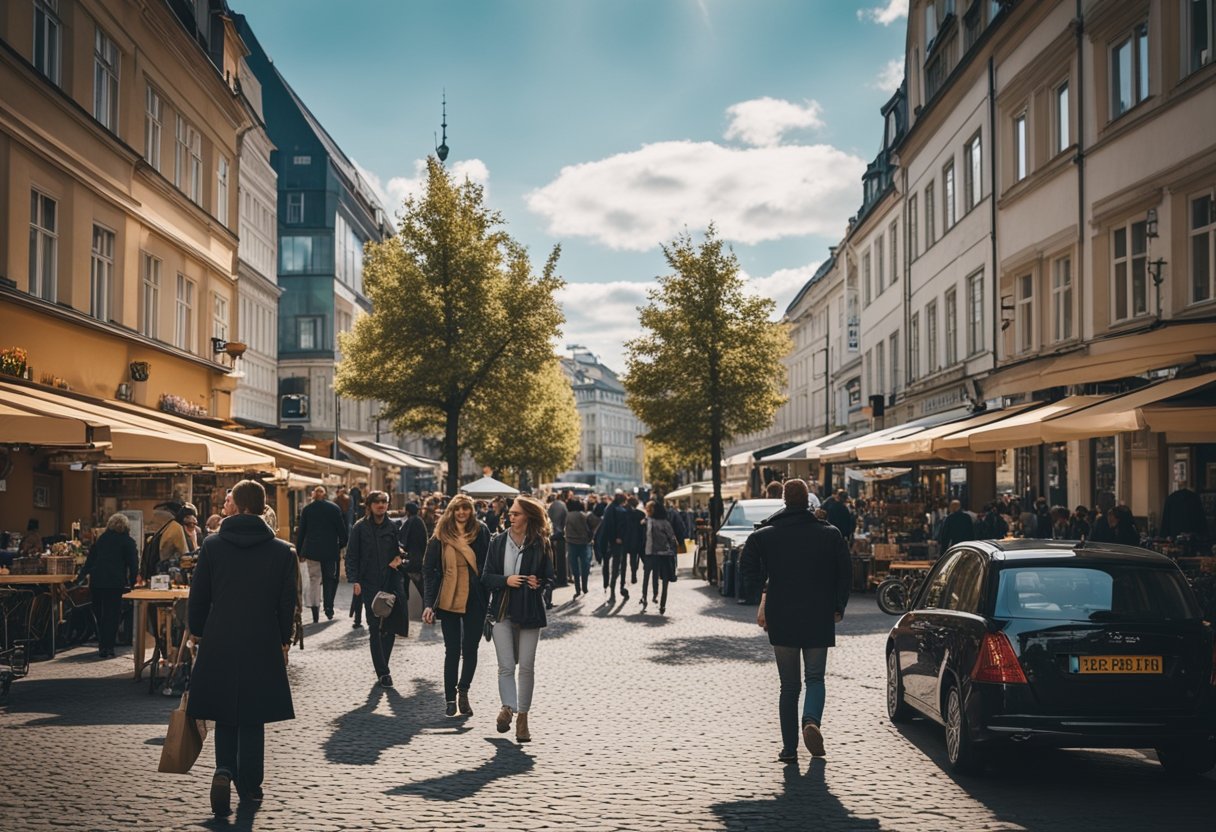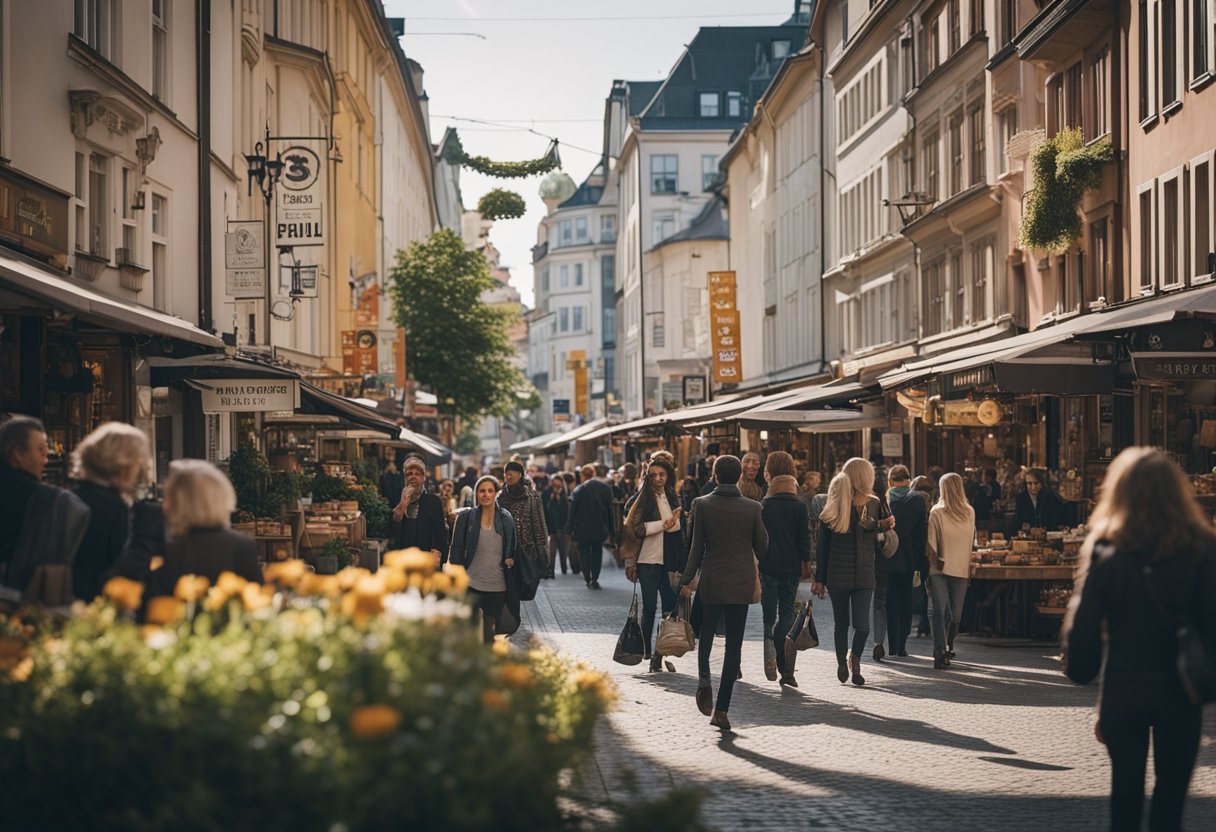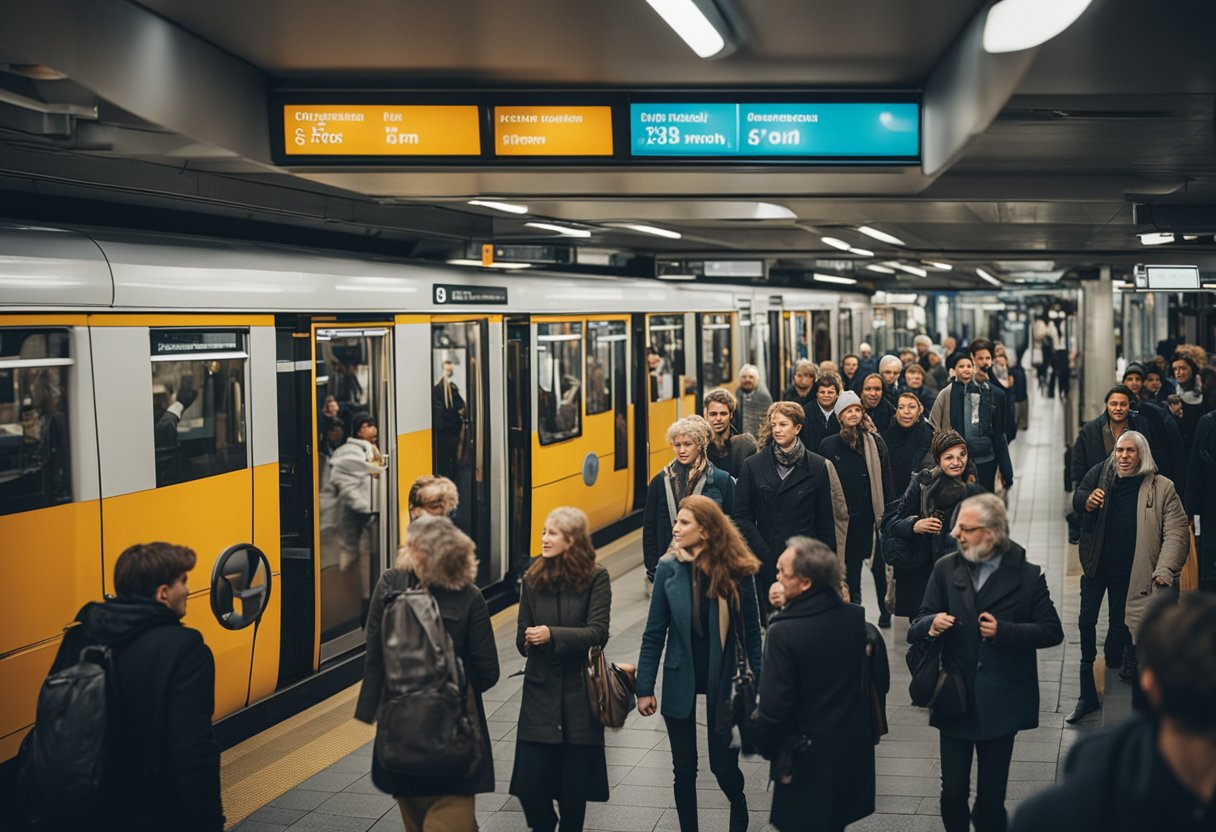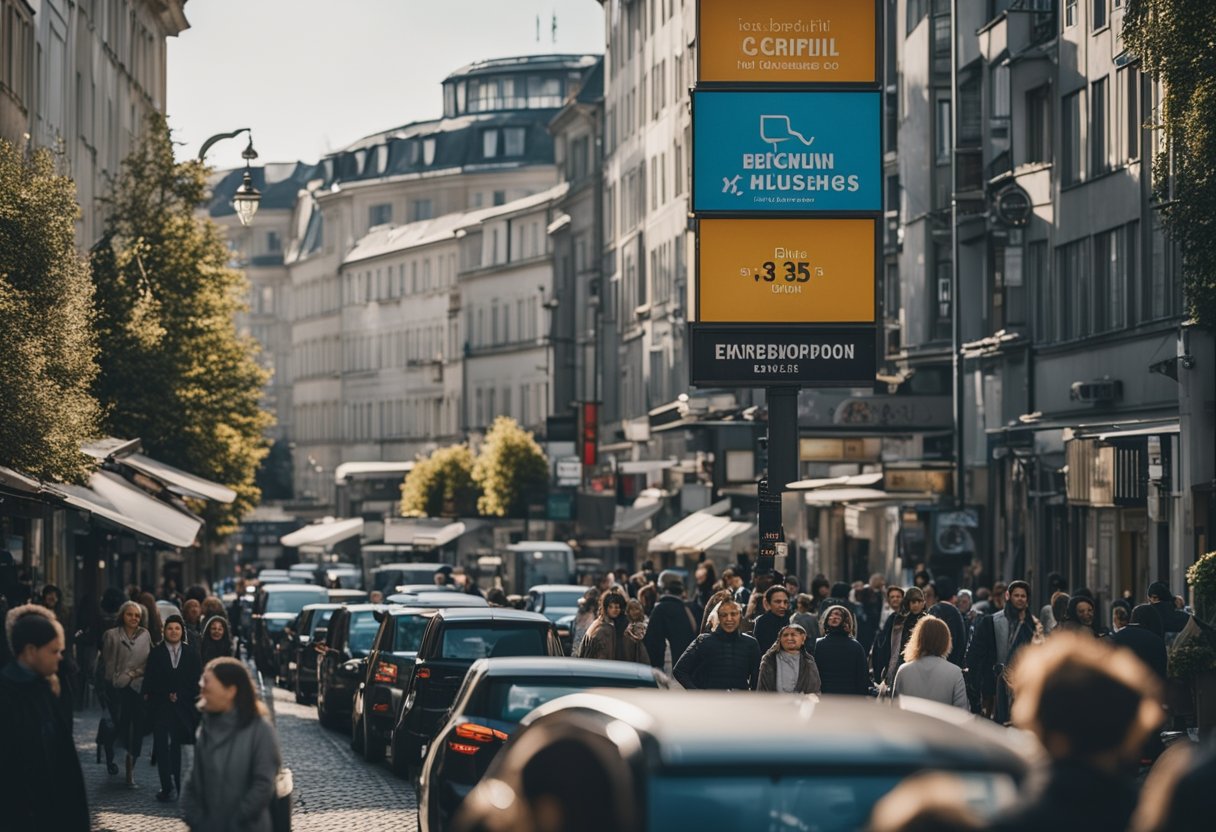Is Berlin Friendly to Foreigners? Unveiling the Capital’s Hospitality Culture
Berlin, a city with a tumultuous history, has emerged as a beacon of multiculturalism and openness in contemporary Europe. We recognize it as a melting pot where people from different cultures and backgrounds converge, making it a particularly compelling destination for expatriates. The German capital prides itself on its progressive attitude, and we see this reflected in how it welcomes foreigners. Residents enjoy various cultural and recreational activities, reflecting the city’s commitment to providing a high quality of life for all, as highlighted by numerous expats’ experiences.
In our discussions about Berlin’s social fabric, it becomes clear that the city isn’t just a place, but a living, ever-evolving cultural landscape. As we observe an increase in the foreign population over recent years, we see this diversity infusing Berlin with new dynamism, which in turn has brought about significant changes. The city’s renowned efficiency in public transportation, healthcare, and low crime rates further enhance its attractiveness to those looking to relocate.
Moreover, the general consensus among expatriates is that despite an initial period of adjustment, Germany, and specifically Berlin, is friendly and welcoming.
Although Germans may have a reputation for being somewhat reserved at first, this characteristic often gives way to warm hospitality as one settles in. Berliners have a reputation for being hostile – unemployment used to be very high in Germany’s capital. The unemployment rate dropped from 13.0% in 2010 to 5.5% in 2019 and it continues to fall.
We find that the continuous flow of different peoples has significantly contributed to making Berlin the cosmopolitan hub it is today.
Historical Context of Berlin
Before exploring the impact of the Berlin Wall and the city’s evolution post-reunification, it’s essential to understand that Berlin’s history has played a pivotal role in shaping its contemporary identity as a multicultural hub. Our examination will delve into two critical periods that have influenced the city’s openness and cultural diversity.
Berlin Wall and Its Impact on Cultural Diversity
When we talk about the Berlin Wall, we’re referring to more than just a physical barrier; it was a symbol of division that affected the lives and culture of Germans on both sides. Erected in 1961, it divided East and West Berlin, restricting movement and, consequently, the exchange of cultural ideas. This division had a profound impact on Berlin’s social landscape, creating two distinct cultures within one city. The wall not only separated families and friends but also prevented the natural flow of multicultural integration that cities typically experience.
Post-Reunification: Evolution of Berlin as a Multicultural Metropolis
Since the fall of the Berlin Wall in 1989 and Germany’s reunification in 1990, Berlin has transformed into a beacon of multiculturalism. Our city’s commitment to openness is evident in its diverse population, which includes a vibrant mix of people from various ethnic backgrounds. This evolution has provided fertile ground for cultural exchange, and Berlin has embraced this, becoming known for its multicultural neighborhoods and contributions to global arts, cuisine, and more. Berlin’s history is a testament to the resilience of its people and their ability to adapt and flourish in a multicultural context.
Quality of Life in Berlin
In our exploration of Berlin’s quality of life, we notice that the city is characterized by its reasonable cost of living, diverse neighborhoods, and comprehensive healthcare system. These factors generally contribute to Berlin’s reputation as a welcoming destination for foreigners.
Cost of Living and Affordability
Berlin offers a cost of living that is relatively lower compared to many other major European cities. Essential expenses such as groceries, leisure activities, and public transportation are fairly priced. In Berlin, we can enjoy a lifestyle that is affordable without compromising on quality. For instance, residents often highlight that eating out and enjoying the varied nightlife in Berlin is accessible due to the affordable prices.
Housing and Neighborhoods
When it comes to housing, Berlin provides a range of options that suit different preferences, from bustling city center apartments to tranquil suburban homes. The neighborhoods are diverse, allowing us to settle in areas that cater to our lifestyle—whether we prefer the historic charm of Mitte or the bohemian vibe of Kreuzberg. Rents vary but are generally reasonable, thus maintaining the city’s reputation for being cost-effective.
Healthcare System and Health Insurance
Our healthcare system in Berlin is robust and delivers high-quality services. Health insurance is mandatory, and the coverage is extensive, allowing us access to a wide range of medical services. Both public and private healthcare options are available, ensuring that every resident has the medical care they need. This inclusive system contributes positively to the overall quality of life for inhabitants of the city.
Cultural and Social Environment
In Berlin, we observe a vibrant and diverse cultural scene that’s welcoming to expatriates and foreigners. Our city boasts neighborhoods known for their strong community vibes and frequent cultural events, each offering a unique experience to its inhabitants and guests.
Integration of Expats and Foreigners
Berlin serves as a mosaic of global cultures with neighborhoods like Kreuzberg, Prenzlauer Berg, and Friedrichshain highlighting the city’s multicultural splendor. In these areas, expatriates and foreigners find a sense of community that eases their transition. For instance, Kreuzberg is renowned for its global cuisine and vibrant street art, often a first stop for new expats who can mingle with both locals and others from abroad. Similarly, Prenzlauer Berg and Friedrichshain are homes to numerous families and young professionals from around the world, fostering an inclusive atmosphere through various social groups and community-centered activities.
Cultural Offerings and Events
We take pride in our city’s plethora of cultural offerings. Events catering to a wide range of interests are a staple in our city’s life, marked by the contributions of artists and creatives from around the globe. Charlottenburg, with its rich history and classic architecture, regularly hosts art exhibitions and performances in renowned venues, which are frequented by locals and expats alike. These events are not only entertaining but also instrumental in bringing together people from different cultures to appreciate and learn from one another’s artistic expressions.
Public Transportation Network
In Berlin, our public transportation network is extensive and inclusive, making the city highly accessible to foreigners. Whether it’s the U-Bahn, S-Bahn, buses, or trams, getting around is streamlined and user-friendly.
Coverage and Accessibility
U-Bahn and S-Bahn: The backbone of Berlin’s transport, the U-Bahn (subway) and S-Bahn (elevated train) routes cover the city comprehensively. With frequent service and numerous lines, they connect central areas to the outskirts, ensuring most destinations within the city are reachable.
Buses and Trams: Complementing the rail services, buses and trams expand the network to areas not served by rail. They are especially useful in the outer boroughs and during the night when the U-Bahn and S-Bahn services are less frequent.
Tickets: Tickets are unified across all modes of transport, simplifying travel and purchase. Visitors can easily obtain them via ticket machines, which offer instructions in multiple languages, or by using the convenient BVG Ticket App, enhancing accessibility for non-German speakers.
Transport Safety and Etiquettes
Safety: Our transport system is equipped with safety features and is monitored to ensure a secure experience for passengers. Regular police patrols and CCTV in stations act as effective deterrents against crime.
Etiquettes: We maintain a culture of respect and politeness on public transport. It’s expected to give up seats for the elderly, disabled, or pregnant passengers and to avoid obstructing doors. Eating, drinking, or playing loud music on public transport is frowned upon to ensure comfort for all passengers.
Economic Opportunities
In Berlin, we observe a dynamic job market that is both inviting and challenging for foreigners. The city offers diverse professional opportunities, yet navigating the economic landscape requires a clear understanding of its intricacies.
Job Market and Professional Environment
Berlin’s job market is vibrant and presents a wealth of opportunities, particularly for professionals and creatives. With a robust startup ecosystem, there’s a continuous demand for innovative minds. The city is known for a variety of job opportunities in sectors such as tech, media, and the arts. However, knowledge of the German language can be a pivotal factor in securing employment. While it’s possible to find English-speaking roles, particularly within international companies or startups, German proficiency greatly enhances job prospects and integration into the local professional environment.
Navigating the job market here is a substantial task, with salaries that can be competitive, depending on the industry. Yet, high taxes in Germany could be a downside that professionals must account for when considering their net income.
Costs and Benefits of Starting a Business
Starting a business in Berlin can be both cost-effective and beneficial given the city’s lower cost of living compared to other major European cities. Creatives and entrepreneurs find Berlin to be a fertile ground for innovation due to more manageable initial overheads.
| Advantages of Starting a Business in Berlin | Disadvantages of Starting a Business in Berlin |
|---|---|
| Lower initial costs | Complex bureaucracy |
| Access to a diverse and creative talent pool | Requirement of German for local dealings |
| Supportive startup ecosystem | High tax rates |
However, the entrepreneurial journey is accompanied by Germany’s stringent regulations and the need to navigate through complex bureaucracy. Despite the challenges, the city’s economy is resilient and offers substantial long-term benefits for committed entrepreneurs.
Safety and Security in Berlin
In evaluating Berlin’s atmosphere for foreigners, we find our attention focused principally on matters of safety and security. Berlin is recognized as a safe city with a dedicated police presence, but like any major metropolitan area, it has its nuances in crime rates and necessitates certain precautions.
Analysis of Crime Rates
When we examine the crime rates in Berlin, statistics show a city that stands out for its relatively low levels of violent crime, indicating a reassuring safety situation for residents and visitors alike. However, issues like pickpocketing and petty theft are more prevalent, especially in crowded tourist hotspots and on public transportation. These non-violent crimes contribute to the overall crime index of the city, suggesting the need for awareness and vigilance.
Precautions and Safety Tips
To navigate Berlin with confidence, we advise adopting a safety guide of practical measures:
- Be mindful of belongings: Pickpockets tend to operate in busy areas. Keep your wallets and phones in secure, closed pockets or bags.
- Common sense: As with any large city, apply common sense by avoiding unlit or less-traveled areas late at night and not displaying valuable items unnecessarily.
- Police presence: The local police are known for being helpful to tourists, and there are ample police stations should you require assistance.
- Safety instructions: Follow any safety instructions provided by local authorities or your accommodation.
By taking these safety precautions, visitors and expatriates can significantly mitigate the risks of theft and enjoy what Berlin has to offer in terms of culture, history, and modern amenities.
Living in Berlin as a Foreigner
Living in the vibrant city of Berlin offers a unique blend of challenges and opportunities. We, as expatriates, face the complexities of bureaucratic navigation but can embrace the cultural dynamism this city has to offer.
Challenges and Opportunities
Berlin stands as a beacon of cultural diversity, welcoming foreigners from every corner of the globe. The prospect of living in Berlin presents us with an attractive quality of life, including an excellent healthcare system and a variety of cultural activities. Nonetheless, as with any major city, expats might experience some discrimination or feel the cultural and language barriers acutely. It is crucial for us to grasp and respect the local customs and laws to integrate successfully.
Navigating Bureaucracy and Paperwork
Handling German bureaucracy can be daunting for us expats. Key to establishing a life here is obtaining the necessary residence permit, which involves navigating a maze of paperwork and appointments. Having our documents in order and understanding the precise requirements is critical. In Berlin, the immigration process is systematic, and patience is often required to adhere to the required protocols.
Important to Remember:
- Keep documents like passports and proof of address up-to-date.
- Familiarize ourselves with the steps for renewing our residence permit.
- Learn about the resources available to help with immigration services.
While the paperwork may seem overwhelming, it is a structured process, and there are services dedicated to assisting foreigners in making Berlin their new home. It is essential that we approach this process methodically to ensure a smooth transition into our new environment.
Educational Perspectives
In Berlin, we recognize the richness that international students add to the educational tapestry, and the city’s infrastructure has evolved to welcome them at various levels of learning. Our schools and universities not only showcase a commitment to academic excellence but also strive to be inclusive communities where cultural diversity is celebrated and supported.
Higher Education and Research Opportunities
Berlin boasts a vibrant higher education landscape with universities such as the Freie Universität Berlin and the Humboldt-Universität zu Berlin, which have a strong international reputation for excellence in research and learning. These institutions offer numerous programs in English, facilitating access for international students whose native language is not German. Our universities are well-equipped with modern internet infrastructure and digital devices to support the learning process. Moreover, research opportunities abound, with generous funding available for cutting-edge projects, especially in fields like sciences, humanities, and engineering.
Language Schools and Integration Courses
To enhance our integration efforts, numerous language schools in Berlin offer German language courses tailored to all proficiency levels, ensuring that foreigners have the tools to thrive in both academic and everyday settings. These integration courses are also an invaluable resource for newcomers to familiarize themselves with German culture and bureaucracy, which can often be overwhelming. It is a priority for us to ensure that every student, regardless of background, can navigate Berlin with confidence and ease.
Lifestyle and Leisure
In Berlin, we find a city that welcomes expats with a vibrant lifestyle and a plethora of leisure activities that cater to a diverse range of interests and tastes. From pulsating nightlife to trendy shopping districts, there’s something for everyone.
Nightlife and Entertainment
Berlin’s nightlife is renowned worldwide for its diversity and vibrancy. We can experience everything from underground techno clubs to laid-back beer gardens. The city’s club scene often hosts world-famous DJs in venues that stay open until the early hours of the morning, making it a haven for night owls and music enthusiasts alike. When it comes to leisure, Berlin offers an array of options—from cozy pubs serving a wide variety of beer to cultural events in open-air venues and traditional theaters.
- Clubs and Bars: Visit the clubs in Berlin, known for their exceptional electronic music.
- Beer Gardens: Unwind at traditional beer gardens, where we can savor local brews in a relaxed atmosphere.
Shopping and Fashion
Shopping in Berlin is an expression of the city’s eclectic and inclusive spirit. We can explore international designer boutiques, local craft stores, and everything in between. Berlin’s fashion scene is a blend of high-end labels and streetwear, often influenced by the city’s unique artistic flair. For leisure shoppers, there are numerous flea markets and vintage shops that offer an array of unique finds and sustainable fashion choices.
- Designer Boutiques: Browse the latest collections from top designers in Berlin’s chic boutiques.
- Vintage and Flea Markets: Discover hidden gems at one of the city’s many markets, perfect for fashionistas with a love for retro styles.




